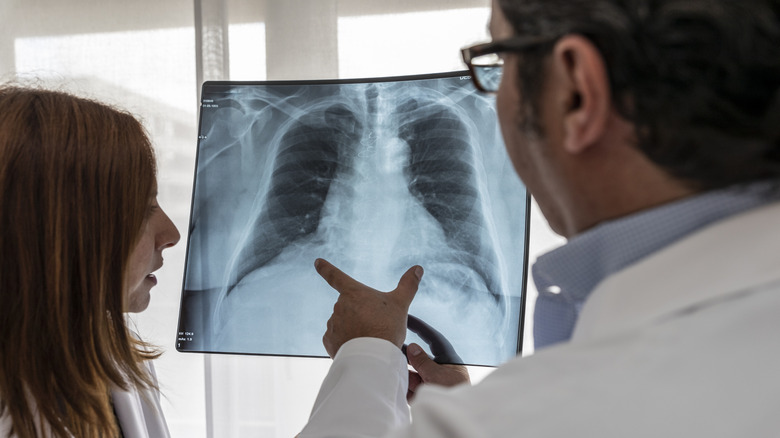Drinking Cranberry Juice Every Day Has An Unexpected Effect On Your Risk Of Lung Cancer
Is cranberry juice a favorite daily drink? If so, you're not just getting a flavorful beverage. You're also potentially protecting yourself against future lung cancer.
Although no single food can prevent cancer, some foods can lower your risk of developing cancer. And cranberries have shown great promise in clinical environments as an anticancer food. In a 2016 study published in Antioxidants, cranberries were identified as potentially inhibiting the growth of cancerous cells. Namely, the study mentioned ursolic acid and proanthocyanidins (both of which can be found in cranberries) as offering protection against the growth of lung cancer, as well as other cancers. Ursolic acid is a compound that's been scientifically investigated as a natural therapy for preventing and treating cancer. Proanthocyanidins are also classified as compounds with similar potential chemopreventative properties. In fact, a 2022 study in Food Bioscience tested the hypothesis that proanthocyanidins derived from grape seeds could reduce the incidence of cancer cells in the liver, and produced positive results.
Another study on proanthocyanidins focused specifically on lung cancer. The 2011 study, published in Molecules, explored the potential for cranberry-extracted proanthocyanidins to negatively affect the growth of lung cancer cells. The researchers concluded that proanthocyanidins held promise in being able to inhibit cancer at the genetic level.
A wealth of cancer-fighting phytochemicals
Ursolic acid and proanthocyanidins aren't the only nutrients in cranberries that seem to be able to mitigate cancerous cell proliferation. A 2007 review in the Journal of Nutrition named a trio of cranberry-based phytochemicals (e.g., resveratrol, quercetin, and epigallocatechin gallate) as all capable of potentially causing death in cancerous cells.
You may have heard of resveratrol before, as it's often associated with cardiovascular health benefits associated with red wine. However, it could be beneficial if you're trying to ward off cancer, too. Resveratrol was studied for its lung-related anticancer effects in a 2019 study in Current Cancer Drug Targets. The study indicated the possibility that treatment with resveratrol might be a way of inhibiting cancer cell lines.
As for quercetin, a 2022 review in Cancer Cell International indicated that quercetin could support the expression of a gene that's thought to fight off cancer development in the lungs. As such, it may also be an important asset to your health that's available in your nearest glass of cranberry juice.
Meanwhile, epigallocatechin gallate, a polyphenol, may be able to help in the battle against lung cancer at a cellular level. A 2023 study in Advances in Redox Research revealed that epigallocatechin gallate seemed to prevent lung cancer cell development by suppressing those cells.
The nutritional value of juice versus fresh berries
These results may be what you've wanted to hear if you love cranberry juice and want to reduce your lung cancer risk. But is cranberry juice enough to get the aforementioned key nutrients into your system? Or do you have to consume whole cranberries to realize the fruit's preventative advantages?
There's no doubt that cranberry juice lacks some of the raw fruit's nutritional profile. For example, you can expect to lose fiber when you limit your intake of cranberries to a juice form. One cup of fresh cranberries packs in 4 grams of fiber, according to WebMD. In comparison, WebMD notes that there's 0 grams of fiber in a cup of cranberry juice. That said, fiber isn't the most important cranberry nutrient if you're mostly interested in drinking cranberry juice as a lung cancer prevention agent.
Of course, you won't get quite the same concentration of compounds like ursolic acid and quercetin when you sip on juice instead of eating whole cranberries, according to Healthline. Nonetheless, you may want to keep drinking cranberry juice as a reliable source of many anticancer nutrients. Plus, those nutrients are likely to be as bioavailable as if you were eating whole berries.


